
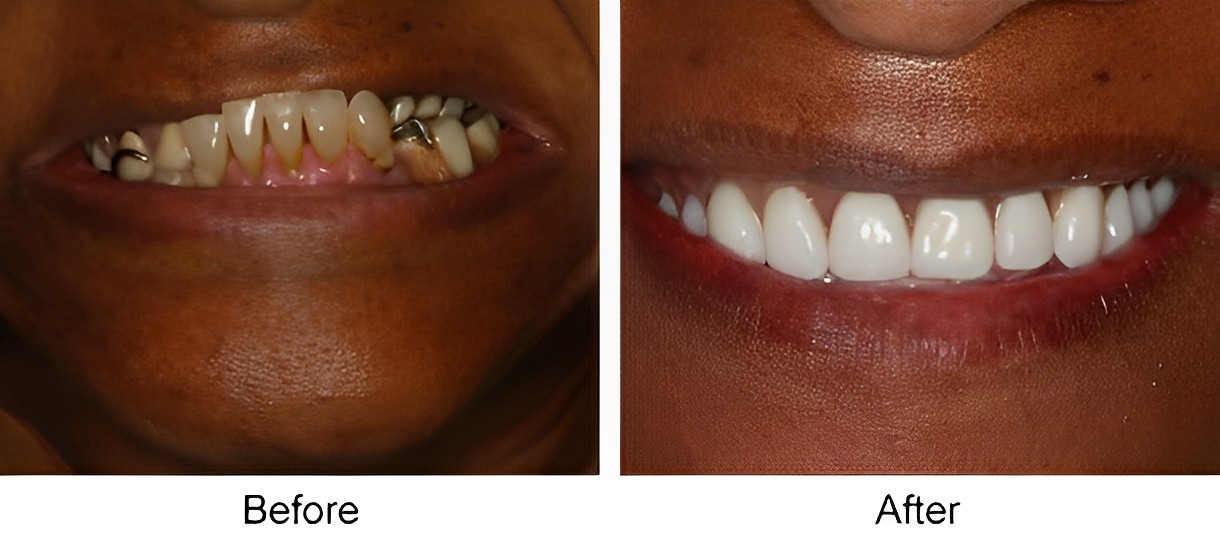
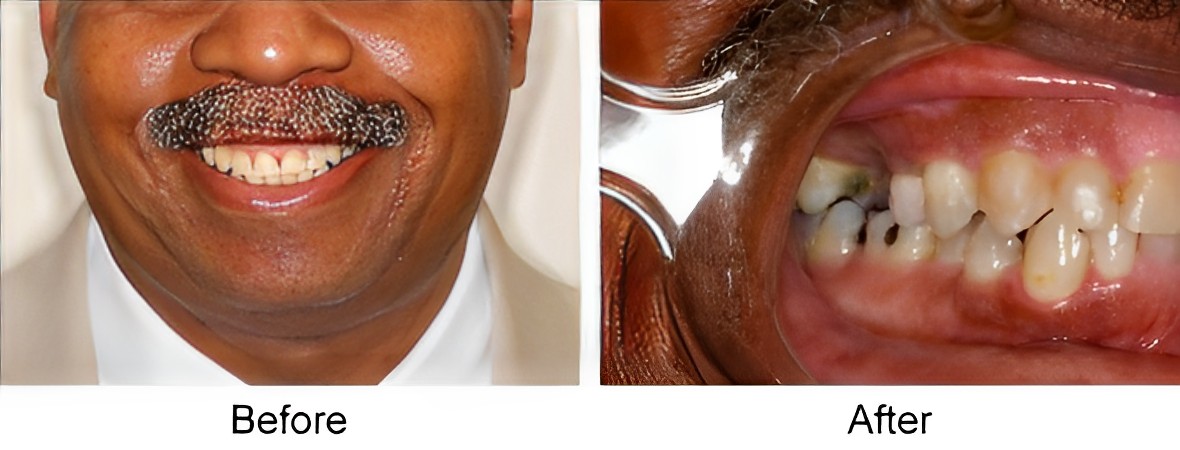
Restore your smile! Replace your Missing Teeth with Dental Implants from Hampton Dental Associates.
With all of the advancements in modern dental care, you’d think that tooth loss would be a thing of the past. Unfortunately, as we at Hampton Dental Associated and many people in Milwaukee area know, people still lose their teeth due to gum disease, poor home dental hygiene, and trauma. However, dental implants provide a more aesthetic and permanent option for fake teeth than traditional dental bridges or dentures.
At Hampton Dental Associates, we are committed to restoring your smile and confidence with quality dental implants.
What are dental implants?
Dental implants are prosthetic replacements for missing teeth. Implants are like “bone screws” and once they are inserted into a person’s jaw they can:
- Replace a single tooth.
- Be used to make a bridge which replaces adjacent missing teeth
- They can be used to hold a denture in place via snaps or attachments that were placed in the implants.
- They can hold on to a bar that a denture will snap on to called a “bar-overdenture.”
- They can be used to permanently hold a denture in place called a “hybrid” prosthesis.
- They can hold a permanent bridge replacing an entire arch of missing teeth!
What are the three parts of a dental implant?
The Post
The implant device itself, inserted directly into the jawbone.
The Abutment
This is often called a “chimney” as it screws into the implant and will become the foundation to hold on to the new crown. This abutment can also have a ‘“snap”screwed into it for a Locator Snap-on-Denture.
Abutments are devices that help us to hold a prosthesis onto the implant and they can be made in several styles, materials and shapes depending upon the type of final prosthesis selected. Abutments can be made out of titanium, zirconia and can be made as custom pieces or pre-fabricated pieces from the implant company.
The Dental Restoration
The part visible above the gum line, consisting of dentures, a dental crown, or a dental bridge.
These restorations can be referred to as Hybrids, Zirconia bridges, porcelain fused to gold bridges, Overdentures, Snap-on-dentures and porcelain fused to gold bridges.
The Post
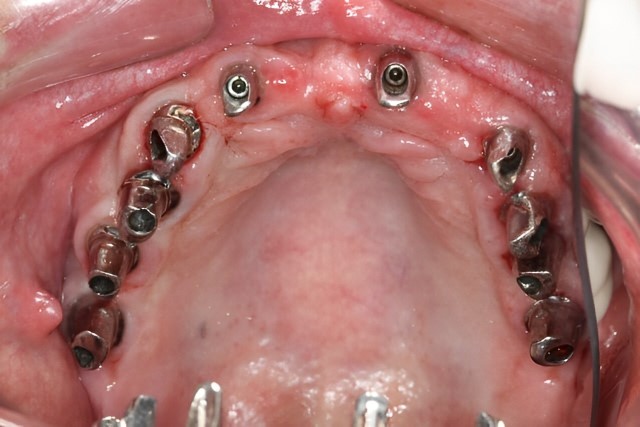
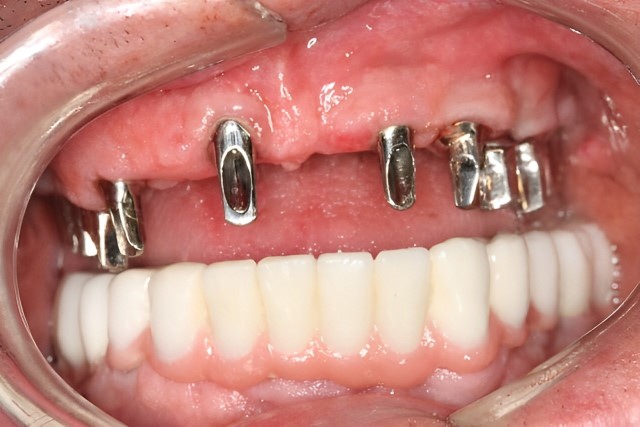
The Dental Restoration
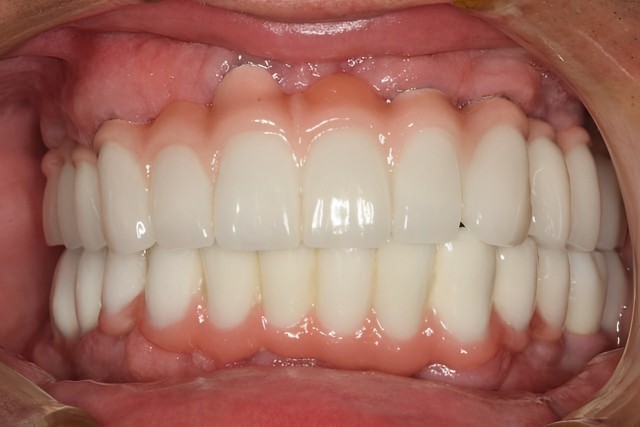
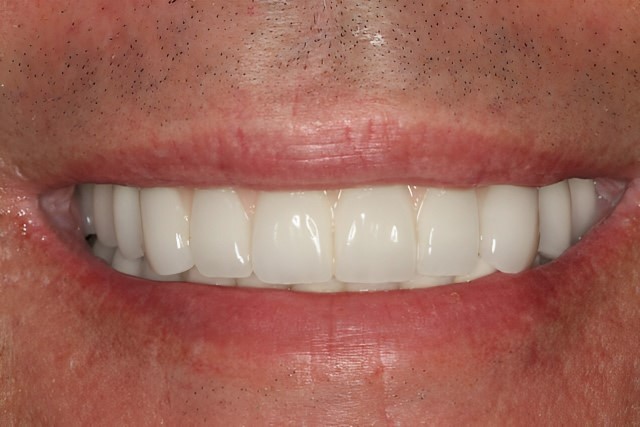
Benefits of Dental Implants
Dental implants have two main benefits over traditional options for missing teeth. First, the implant bonds or integrates with the underlying jawbone. Since they have been designed to take the place of tooth roots they must be fully integrated into the bone prior to making a final restoration. Implants will feel as natural and as sturdy as a patient’s original teeth. Secondly, dental implants do not impact surrounding teeth. While you can have bone loss around teeth and around implants, by having an implant and not joining teeth together with a bridge, it is much easier to clean the implant tooth over cleaning under a bridge. Since your natural teeth are left intact, the implant provides significant long-term benefits to your oral health. Dental implants also give patients a boost in confidence. Patients can eat foods they have avoided, smile and talk without being self-conscious, and know that their dental restoration will stay firmly in place. Dental implants are incredibly reliable. You do need to know that while implants are wonderful tooth replacements, they do require diligent cleaning, and monitoring of the bite or occlusion to ensure long-term implant health and survival.
The Dental Implant Consultation
During your consultation at our Milwaukee office, your dentist will discuss your tooth replacement and dental implant options in depth. Almost anyone fit enough to undergo a routine dental extraction or oral surgery is a good candidate for a dental implant. The dentist at Hampton Dental Associates will examine if you have sufficient jawbone mass and healthy gum tissue, free of periodontal disease.
Who is a good candidate for dental implants?
Patients who practice good oral hygiene and visit their dentist for regular checkups are good candidates for this procedure. Smokers, people who have uncontrolled chronic disorders, or those who have underlying health conditions may be required to undergo evaluation on an individual basis.
Dr. Winter, ABOI/ID Diplomate
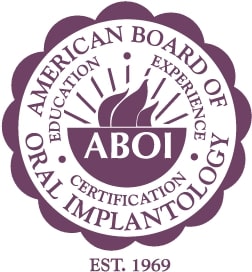
The ABOI/ID Diplomate designation shows the highest level of competence in implant dentistry. Dr. Richard Winter is one of only 550 dentists in the United States to be an ABOI/ID diplomate.
Types of Dental Implants
Hampton Dental Associates offer three main types of implants:
- Traditional Implants
- Mini Dental Implants
- Same Day Dental Implants
Your dentist will speak to you about which option is best for you during your consultation.
The Dental Implant Procedure
- Local anesthesia is usually adequate for these outpatient procedures, but in more involved cases intravenous sedation may also be used.
- The first part of the implant process consists of surgically burying the implant into the jawbone. It is placed beneath the gum to protect the implant from any force while it is healing for several months.
- After a period of bone healing, your dentist will surgically expose the implant and place a healing cap which will connect the implant to the outside world and allow the soft tissue to heal properly prior to making the implant restoration.
- The surgeon then fixes posts, or abutments onto the implant. The gum is permitted to settle around the abutment and form a cuff or collar. This stage will provide the dentist with access to the implant when preparing the final restorative stage.
- Once the implants have had an opportunity to heal and have been tested for effective integration, the restorative dental work is then affixed to the successfully osseointegrated implants.
Are There Any Risks With Dental Implants?
While dental implants are a safe procedure and Dr. Winter provides high-quality treatment with patient safety always in mind, there are a few risks from dental implants that patients should be aware of. Swollen gums, tooth sensitivity, and achiness after your treatment is common and typically subside within a few days to a week. However, if you experience any of the following severe risks during your recovery period, it's important to contact your doctor immediately:
- Infection at the implant site
- Nerve damage
- Constant bleeding that hasn’t subsided
- Sinus damage
- Numbness of the gums
Under Dr. Winter's care, many of these risks can easily be avoided, and with the proper recovery techniques, a lot of the common side effects will subside in a few days. Most patients report no pain and undergo uneventful healing.
How Long Will It Take to Recover from the Dental Implant Procedure?
Your mouth, gums, and teeth may feel sore, achy, sensitive, or swollen within the first few days after your dental implant procedure. However, after a few days, these side effects will disappear as your healing improves.
To avoid any complications during your recovery period, you must avoid the following:
- Smoking or Vaping or using any smoking device
- Using straws
- Harsh rinsing
- Hard, chewy, tough foods
- Eating extremely hot foods or drinks
- High-intensity exercise
- Physical activity that has the potential to cause trauma to the mouth
It takes a full two weeks for most patients to feel fully recovered. After two weeks, you will be able to eat, talk, and laugh without any pain at all, and your implants will begin to feel like a natural part of your mouth.
How Long Will My Dental Implants Last?
Dental implants are designed to last anywhere between 10 to 30 years. However, it’s important to note that the lifespan of a dental implant depends largely on the patient’s behavior and oral care techniques. Brushing, flossing, and getting your teeth regularly cleaned by a professional can help keep your implants as healthy as possible. Quitting smoking and tobacco cessation will help improve oral health. If you grind your teeth at night, it may be best to invest in a mouth guard, as this can also damage your implants.
Taking little steps to take care of your teeth will prompt oral health and lead to long-lasting dental implants. Patients who have good oral hygiene routines are able to enjoy their new smiles for a lifetime!
Dental Implants FAQs
Will people be able to tell that I have a dental implant?
Dental implants are expertly crafted to mimic the look of your natural teeth. The shape and color of the crowns that are screwed into or cemented on to the implant abutment are matched to the best of our ability to your natural teeth. The crown atop the implant is made from high-quality materials that reflect light similarly to tooth enamel, enhancing aesthetic appeal and blending seamlessly with your smile. Most people will not be able to tell the difference between your implant and natural teeth, allowing you to smile confidently.
How many dental implants can I have in my mouth?
There is no upper limit to the number of dental implants you can have as long as there is sufficient jawbone to support them. Implants can be used to replace a single tooth, multiple teeth, or all teeth in the mouth. In cases of substantial tooth loss, implant-supported bridges or dentures can be used, which require fewer implants to support more prosthetic teeth. So when you hear about All on 4 or All on 6 it is that an entire arch of teeth may be supported by 4 or 6 implants or more.
How does a dental implant compare to other tooth replacement options?

Does insurance cover dental implants?
While dental implants are an investment, they are not always covered by insurance policies. Some insurance plans might cover part of the procedure, such as the crown, but not the implant itself. It's important to review your insurance benefits or speak directly with your provider to understand what parts of the procedure might be covered. For those without coverage, our office offers financing plans, allowing you to spread the cost over time with manageable payments. Insurance companies have not kept up with inflation or lab charges so ask your dentist about the type of prosthesis you can have and the options to insurance.
What is the expected lifespan of a dental implant?
Dental implants are designed to be a long-term, permanent solution. The titanium post, once integrated with the bone, can last a lifetime with proper oral hygiene and regular dental check-ups. The crown may require replacement after 10-15 years due to normal wear, but the underlying implant remains durable. If you break your implant, abutment (chimney), screws, you may require replacement but with great care and avoiding certain high stress foods like gum chewing, your implants can be a great solution.
Are there any dietary restrictions after getting dental implants?
Immediately following the placement of implants, you'll need to eat soft foods to avoid disrupting the healing process. As the implants heal and fuse with the bone—a process that can take several months—you'll gradually be able to reintroduce harder and chewier foods into your diet. Once fully healed, you can eat normally since implants are designed to function just like your natural teeth. It is important to know that implants are not teeth. There is no ligament or shock absorber to implants so choosing which foods to enjoy will allow implants to last longer.
Why should I choose Hampton Dental Associates for my dental implants?
Hampton Dental Associates offers a unique combination of experience, patient-centered care, and advanced technology. With a long-standing reputation in the community, we focus on providing personalized treatments that are tailored to individual needs and goals. Dr. Winter’s use of state-of-the-art technology and techniques ensures that dental implant procedures are effective and minimally invasive, enhancing both the functionality and aesthetics of your smile. This commitment to excellence in dental care makes us a preferred choice for dental implants for patients in and around Milwaukee.
Schedule a Consultation Today
If you’re ready to achieve the smile you’ve always wanted, call 414-464-9021 to find out if you’re a candidate for dental implants. Click here to book your first consultation with Dr. Richard Winter today, or stop by our office in Milwaukee, WI, to learn more about the dental treatments Hampton Dental Associates, SC is proud to offer! Dr. Winter holds the top credentials in implant dentistry. He is a Diplomate of the American Board of Oral Implantologist. He achieved Diplomate, Master and Fellow in the International Congress of Oral Implantologists. He has received a Fellowship in the American Academy of Implant Dentistry and has a passion to help you with your implant needs. Please visit our publication page for more articles on implant dentistry.
More Information on Dental Implants
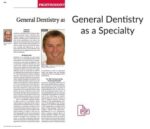
Read “General Dentistry as a Speciality”, the published article on the patient features on this page.
Click here to read more about this Dental Implant patient case study.
Call 414-464-9021 for information on any of our services.
Check out our Dental Blog >>
Read our Patient Case Studies >>
Hampton Dental Associates is proud to offer affordable dentistry programs to help you regain your perfect smile.
Learn more about our affordable dentistry options.




